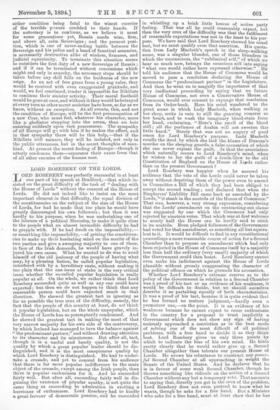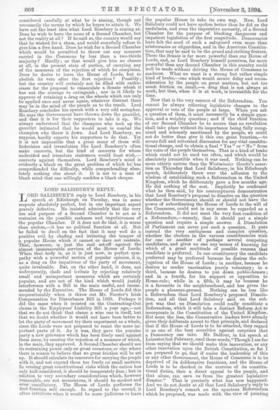LORD ROSEBERY ON THE LORDS.
LORD ROSEBERY was perfectly successful in at least one part of his speech at Bradiord,—that which in- sisted on the great difficulty of the task of "dealing with the House of Lords" without the consent of the House of Lords. He did not indeed like to insist on the most important element in that difficulty, the equal division of the constituencies on the subject of the sins of the House of Lords, for had he made that too plain he would have greatly discouraged his own followers ; but then it was hardly to his purpose, when he was undertaking one of the labours of a political Hercules, to make it quite clear to the people what an almost invincible difficulty he had to grapple with. If he had dwelt on the impossibility,— or something like impossibility,—of getting the eonstituen- cies to make up their hesitating mind on the merits of the two parties and give a sweeping majority to one of them, in face of the Irish demands, he would have gravely in- jured his own cause. What he wanted to do was to avail himself of the old jealousy of the people of having what may, by a pleasing fiction, be called popular legislation, interfered with by a hereditary caste, without making it too plain that the one issue at stake is the very critical issue whether the so-called popular legislation is really popular at all. On the whole, we rather think that Lord Rosebery succeeded quite as well as any one could have expected ; but then we do not happen to think that any reasonable person could have expected much in that direction. He showed the greatest tact in ignoring as far as possible the true crux of the difficulty, namely, the fact that the people of this country at least, do not think it popular legislation, but on the whole unpopular, which the House of Lords has so peremptorily condemned. And he showed the greatest tact in making the most of that very narrow majority for his own side of the controversy, by which Ireland has managed to turn the balance against "the predominant partner," and without drawing attention to its character and its minuteness. But after all, tact, though it is a useful and handy quality, is not the quality by which a great popular leader should be dis- tinguished, and it is the most conspicuous quality by which Lord Rosebery is distinguished. He had to under- take a crusade, and yet to conceal from his audience that there is far more popular indifference to the main object of the crusade, except among the Irish people, than there is popular enthusiasm for it. And he succeeded fairly well. But after all, succeeding fairly well in dis- guising the existence of popular apathy, is not quite the same thing as succeeding to admiration in exciting a hurricane of enthusiasm. Lord Rosebery had to kindle a great fervour of democratic passion, and he succeeded in whistling up a brisk little breeze of active party feeling. That was all he could reasonably expect, but then the very crux of the difficulty was that the fulfilment of reasonable expectations was not in the least to his pur- pose. We have said that Lord Rosebery showed his usual tact, but we must qualify even that assertion. His quota- tion from Lady Macbeth's speech in the sleep-walking scene, was a singular blunder, one of those blunders in which the unconscious, the "subliminal self," of which we hear so much now, betrays the conscious self into saying "what one would rather have expressed otherwise." He told his audience that the House of Commons would be moved to pass a resolution .declaring the House of Commons the "predominant partner" in the Legislature. And then he went on to magnify the importance of that very ineffectual proceeding by saying that no future House of Commons, not even a Conservative House of Commons, would ever consent to expunge that resolution from its Order-book. Here his mind wandered to the great scene in which Lady Macbeth, when walking in her sleep, seeks in vain to still the gnawing remorse at her heart, and. to wash the imaginary blood-stain from her hand, exclaiming, "Here's the smell of the blood still ; all the perfumes of Arabia will not sweeten this little hand." Surely that was not an augury of good omen for Lord Rosebery's purpose. Lady Macbeth recalls the deed by which she laid the blame of Duncan's murder on the sleeping guards, a false accusation of which she can never expiate the guilt. Is that the association which naturally occurs to Lord Rosebery's mind, when he wishes to lay the guilt of a death-blow to the old Constitution of England on the House of Leeds rather than on the present Government ?
Lord Rosebery was happier when he assured his audience that the veto of the Lords could never be taken away without depriving them of the power even to amend in Committee a Bill of which they had been obliged to accept the second reading ; and declared that when the Employers' Liability Bill came back as amended by the Lords, "it stank in the nostrils of the House of Commons." That was, however, a very strong expression, considering that the Lords' amendment on the contracting-out clause was suggested by one which the Commons had only rejected by nineteen votes. That which was at first welcome to nearly half the House can be hardly said to stink in its nostrils. Even pledged followers of the Government had voted for that amendment, or something all but equiva- lent to it. It would be difficult to find in any constitutional proceedings a more reasonable course of action for a Second Chamber than to propose an amendment which had only been rejected in the House of Commons itself by a majority less than half the ordinary (very small) majority of which the Government could then boast. Lord Rosebery cannot even make his indictment against the House of Lords plausible without grossly exaggerating the character of the political offence on which he grounds his accusation.
Whether Lord Rosebery's extreme reserve as to the policy of the Government in relation to a Second Chamber was a proof of his tact or an evidence of his weakness, it would be difficult to decide, but we should ourselves describe it as partaking equally of both characteristics. It was a proof of his tact, because it is quite evident that he has formed no mature judgment,—hardly even a premature one,—on the point. It is an evidence of his weakness because he cannot expect to rouse enthusiasm in the country for a proposal to trust implicitly a Government which does not show any sign of having seriously approached a conviction as to the best mode of solving one of the most difficult of all political problems, with a free hand to decide it as they think best. Lord Rosebery gives us only three points by which to indicate the bias of his own mind. He hints pretty clearly that he would rather give up a Second Chamber altogether than tolerate our present House of Lords. He avows his reluctance to construct any power- ful Second Chamber at all approaching in weight the Senate of the United States. And he declares that he is in favour of some weak Second Chamber, though he throws something like ridicule on the notion of a Second Chamber without any but a temporary veto. That amounts to saying that, directly you get to the crux of the problem, Lord Rosebery does not even pretend to know what he wants, though he asks for a free hand. But a Minister who asks for a free hand, must at least show that he has considered carefully at what he is aiming, though not necessarily the means by which he hopes to attain it. We have not the least idea what Lord Rosebery is aiming at. Does he wish to have the name of a Second Chamber, but not the reality at all ? If he said so, the country would say that he wished for a sham, and would scornfully refuse to give him a free hand. Does he wish for a Second Chamber which would be permitted to throw out any measure carried in the Commons by less than a two-thirds majority ? Hardly; as that would give him no chance at all, in the present state of parties, of carrying any of the measures of the rejection of which he complains. Does he desire to leave the House of Lords, but to abolish its veto after the first rejection ? Possibly; but the country will certainly not be filled with enthu- siasm for the proposal to emasculate a Senate whiali it has not the courage to extinguish ; nor is it likely to approve of retaining a drag on the wheels which can only be applied once and never again, whatever distrust there may be in the mind of the people as to the result. Lord Rosebery concludes his speech with a very odd metaphor. He says the Government have thrown down the gauntlet, and that it is for their supporters to take it up. We always understood that the champion who took up the gauntlet intimated that he would meet in combat the champion who threw it down. And Lord Rosebery, we suppose, hardly expects his supporters to do that. Yet it is not impossible that a great many of them will. Indecision and irresolution like Lord Rosebery's often make converts, but the kind of converts for whom undecided and irresolute statesmen would least wish,— converts against themselves. Lord Rosebery's mind is evidently a blank on the great problem of which he has comprehended the difficulty, while comprehending abso- lutely nothing else about it. It is not to a man of blank mind that one willingly confides a blank cheque.



















































 Previous page
Previous page